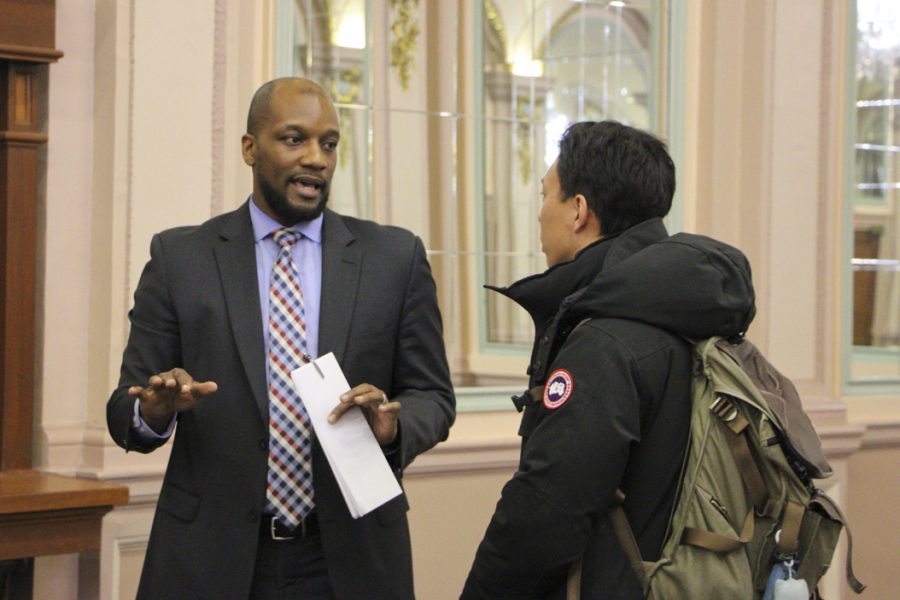Pitt students and faculty used markers, large posters and brainpower Tuesday evening to address diversity and inclusion at Pitt.
In the second installment of Pitt’s Dialogue with the Dean, a University-sponsored conversation as part of Pitt’s Year of Diversity, Vice Provost and Dean of Students Kenyon Bonner and other faculty hoped to learn more about what concerns Pitt students had about diversity and inclusion on campus since they last spoke. Twenty-nine Pitt students and faculty gathered in the Union to reinforce their support for issues that had been brought up at the first session in October.
Springboarding from the last discussion, the attendees discussed getting more support and aid for low-income students and promoting more events and programs concerning minority groups on campus. They also brought up new concerns, including the need to encourage inclusion in future newcomers to Pitt as well as upholding students’ personal beliefs and concerns.
“The country is a lot different now than it was in October,” Bonner said. “We want to make sure that what people prioritized in October is what they are still prioritizing now, and that we didn’t miss anything.”
Bonner said the University will take the suggestions and concerns to pinpoint what the most pressing issues on campus are. He said Pitt will use feedback from the talks to continue raising awareness about diversity’s importance and making sure all students feel comfortable on campus.
“This isn’t just so I can say ‘Oh, I did two talks,’” Bonner said. “I want to do something with what I’ve heard here.”
At the last Dialogue with the Dean event, held Oct. 4, attendees spoke about the need for more political, financial and racial diversity on campus, as well as ways to educate people on the gaps between people from different backgrounds.
At the most recent event, attendees were split into five groups and given a large sheet of paper and markers. They were tasked with coming up with solutions to key problems concerning diversity and inclusion, such as how to increase talk about diversity and make people more aware of inclusive policies on campus.
While students discussed which categories were the most important for Pitt to focus on, many mentioned a need for professors to encourage political discussions among students.
Beside Pitt’s faculty, attendees also want Pitt’s student body to be more diverse. Vinh Luong, a sophomore computer science major, said Pitt needs to do more to recruit students from diverse backgrounds in order to create a better learning environment, as well as more creativity and understanding.
Luong, a graduate of Central High School in Philadelphia, one of the nation’s most diverse schools, said he experienced culture shock upon coming to Pitt.
“I guess I sort of took the diversity at my high school for granted,” Luong said. “I think it’d be great if Pitt would encourage more exploration and community building between everyone at Pitt.”
Jenea Lyles, a first-year microbiology and sociology major, said she would like Pitt to encourage students to try supporting groups that they do not know much about.
“It’d be cool if more was done to encourage men to check out the Campus Women’s Organization and for white people to get involved with organizations like Black Action Society,” Lyles said.
Following this theme of exploration and education, students brainstormed diversity awareness tools like a Campus Clarity-type app which would teach students what microaggressions are and how they affect people, as well as a first-year seminar about diversity taught by upperclass students or teacher’s assistants.
Edenis Augustin, a first-year psychology major, said incoming students should be exposed to the diversity already present at Pitt as a way of comforting students from less represented racial and financial backgrounds.
“I know it was comforting for me to see during [Orientation Week] that there were so many people on the faculty and in my class that were from diverse backgrounds, and I think that should be continued,” Augustin said.


